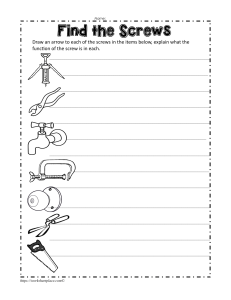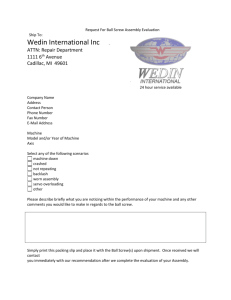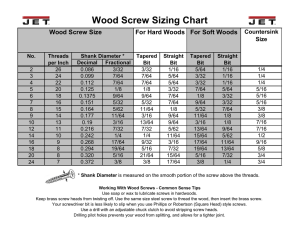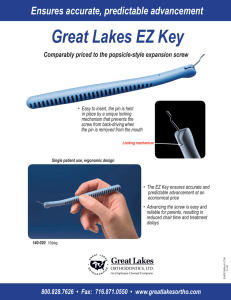Engineering How to use simple machines Desinging simple machine Presentation Screew
advertisement
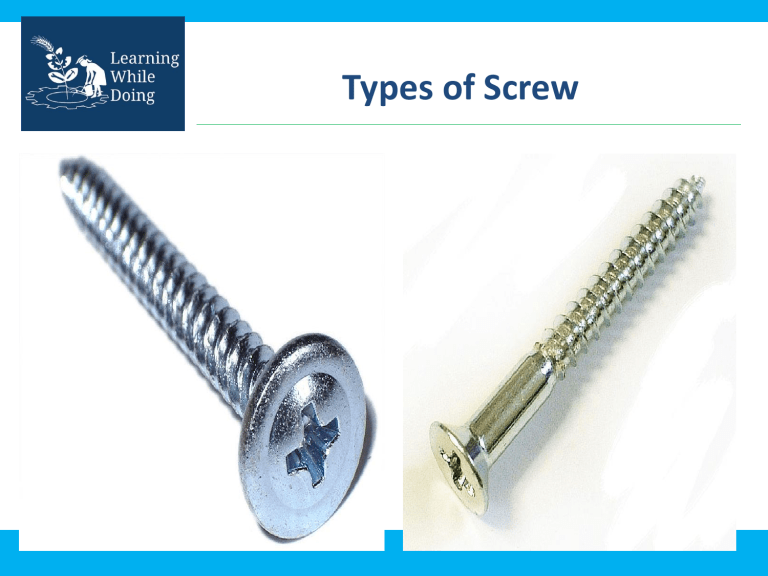
Types of Screw Mirror screw This is a flat-head wood screw with a tapped hole in the head, which receives a screw-in chromeplated cover. It is usually used to mount a mirror • Drywall screw Specialized screw with a bugle head that is designed to attach drywall to wood or metal studs, however it is a versatile construction fastener with many uses. The diameter of drywall screw threads is larger than the shaft diameter. Eye screw Screw with a looped head. Larger ones are sometimes called lag eye screws. Designed to be used as attachment point, particularly for something that is hung from it. Lag screw / Coach screw Similar to a wood screw except that it is generally much larger running to lengths up to 15 in (381 mm) with diameters from 0.25–0.5 in (6.35–12.70 mm) in commonly available (hardware store) sizes (not counting larger mining and civil engineering lags and lag bolts) and it generally has a hexagonal drive head. the lag manufactured with a hard metal jacket that bites into the sides of the drilled hole, and the inner metal in the lag being a softer alloy of lead, or zinc alloyed with soft iron. The coarse thread of a lag bolt and lag mesh and deform slightly making a secure near water tight anticorroding mechanically strong fastening. Uses Lag bolts are usually used with an expanding insert called a lag in masonry or concrete walls, Lag bolts are designed for securely fastening heavy timbers (post and beams, timber railway trestles and bridges) to one another, or to fasten wood to masonry or concrete. Sheet metal Screw • Has sharp threads that cut into a material such as sheet metal, plastic or wood. They are sometimes notched at the tip to aid in chip removal during thread cutting. The shank is usually threaded up to the head. Sheet metal screws make excellent fasteners for attaching metal hardware to wood because the fully threaded shank provides good retention in wood Wood Screw • A metal screw with a sharp point designed to attach two pieces of wood together. Wood screws are commonly available with flat, pan or oval-heads. A wood screw generally has a partially unthreaded shank below the head. The unthreaded portion of the shank is designed to slide through the top board (closest to the screw head) so that it can be pulled tight to the board it is being attached to. Hex cap screw • A hex cap screw is a cap screw with a hexagonal head, designed to be driven by a wrench (spanner). An ASME B18.2.1 compliant cap screw has somewhat tighter tolerances than a hex bolt for the head height and the shank length. The nature of the tolerance difference allows an ASME B18.2.1 hex cap screw to always fit where a hex bolt is installed but a hex bolt could be slightly too large to be used Self-drilling screw • Similar to a sheet metal screw, but it has a drill-shaped point to cut through the substrate to eliminate the need for drilling a pilot hole. Designed for use in soft steel or other metals. The points are numbered from 1 through 5, the larger the number, the thicker metal it can go through without a pilot hole. A 5 point can drill a 0.5 in (12.7 mm) of steel, for example Self-tapping machine screw • A self-tapping machine screw is similar to a machine screw except the lower part of the shank is designed to cut threads as the screw is driven into an untapped hole. The advantage of this screw type over a self-drilling screw is that, if the screw is reinstalled, new threads are not cut as the screw is driven. Set screw / Grub screw • A set screw is generally a headless screw but can be any screw used to fix a rotating part to a shaft. The set screw is driven through a threaded hole in the rotating part until it is tight against the shaft. The most often used type is the socket set screw, which is tightened or loosened with a hex key. Security head screw • These screws are use for security purpose. The head of this type of screw is impossible to reverse. It requires special tools or mechanisms like spanners, tri-wings, torxes, square drivers, etc. In some screws, the head can be removed by breaking it after installing the screw. Twinfast screw • A Twinfast screw is a type of screw with two threads so that it can be driven twice as fast. Dry wall screws designated as fine are the most common screws to use the twin fast style of threads Deck screw • Similar to drywall screw except that it has improved corrosion resistance and is generally supplied in a larger gauge. Most deck screws have a type-17 (auger type) thread cutting tip for installation into decking materials
